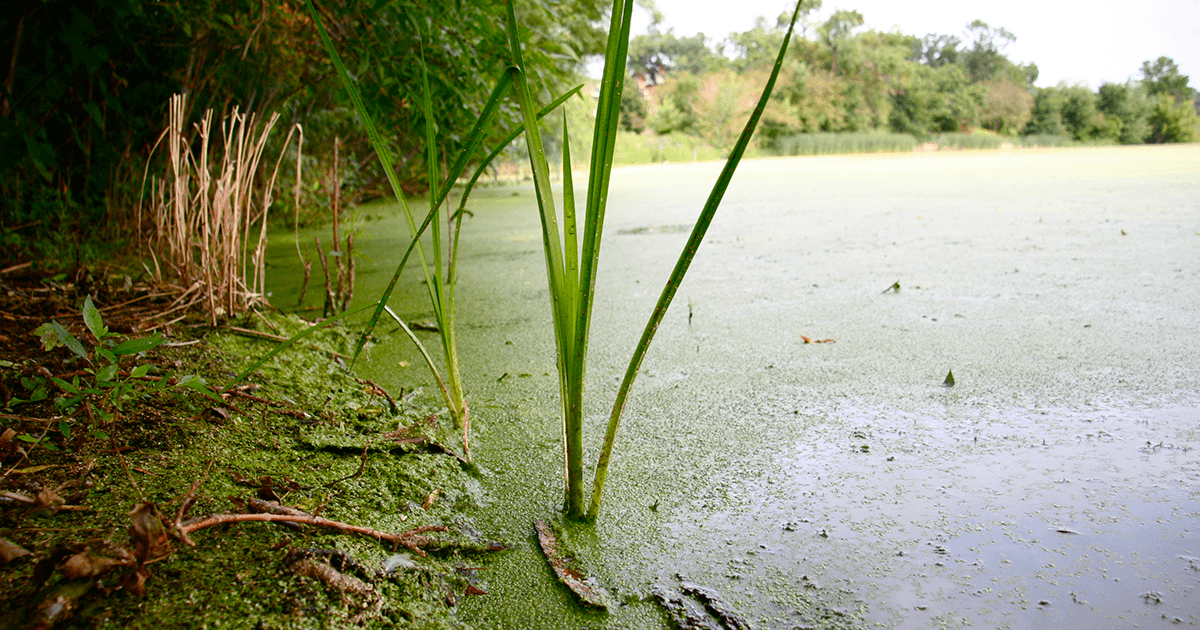How clean water and the Mississippi River fared in the bonding bills
We expected a bonding bill would fund projects to protect our drinking water, lakes and rivers from pollutants like excess phosphorous causing this algae bloom. (Photo: MPCA Photos)
This legislative session, time ran out for any bonding bill. That's unfortunate since bonding can fund crucial public projects and put Minnesotans to work. The bonding bill is where we expected to see investments in basic updates to our drinking water systems, a new River Learning Center and more.
What's a bonding bill?
First, a quick review: A bonding bill is a capital investment bill that allows the state to borrow upfront funds for large projects while spreading the costs out over time at low-interest rates, kind of like a home mortgage. Our state generally passes a bonding bill every other year. The last was in 2018.
One of FMR’s top priorities this legislative session was bonding for clean water and a healthy Mississippi River. After the governor released his recommendations early in the session, it was up to the House and Senate to draft their own versions and earn the required 60% votes in each chamber to pass their bills. That hasn't happened ... yet.
Here’s how FMR's priorities stacked up in the governor, House and Senate proposals before the session ended, and what the prospects are for these projects in a likely special session.
Status: Fix the Pipes
FMR is excited to be a part of the Fix the Pipes Alliance — a new coalition of business, environment, local government, engineering and trade groups from all across Minnesota. While we don’t always agree on everything, we all agree that clean water is essential for life and health, and we need to invest in our water infrastructure.
That’s why we joined together to ask Minnesota lawmakers to #FixthePipesMN and pass a comprehensive bonding bill in 2020 that includes at least $300 million to replace and improve aging water infrastructure.
Here's what the governor, House and Senate proposed for clean water:
• Governor’s proposal: $300 million
• House proposal: $327 million
• Senate proposal: $149 million
Status: The Conservation Reserve Enhancement Program
The Minnesota Conservation Reserve Enhancement Program (CREP) funds permanent conservation easements in ecologically sensitive areas to improve water quality and wildlife habitat.
Full funding (at least $16 million) this year will secure an additional $33 million in federal matching funds. In addition, bonding for this program is especially important this year, as the Clean Water Fund (which has recently been tapped to backfill shortfalls in CREP bonding) has a $17 million shortfall in revenue projects this year due to COVID-19-related sales tax declines.
Here's what the governor, House and Senate proposed for CREP:
• Governor’s proposal: $16.5 million
• House proposal: $12.5 million
• Senate proposal: $1 million
Status: The River Learning Center
The River Learning Center will be home to the National Park Service’s Mississippi National River and Recreation Area headquarters and offer year-round, river-oriented experiences focused on the land, water and culture of the river, enhancing public connections to this incredible natural resource that we need now more than ever.
Here's what the governor, House and Senate proposed for this center:
• Governor’s proposal: $3 million
• House proposal: $3 million
• Senate proposal: none
Status: A private concert venue on public land in Minneapolis
The Upper Harbor Terminal concert venue was thankfully not included in the governor’s proposal but remains in discussions at the Legislature. The proposal, which FMR strongly opposes, would use land currently in public ownership to build a privately-operated concert venue adjacent to the river in North Minneapolis.
Here's what the governor, House and Senate proposed for this project:
• Governor’s proposal: none
• House proposal: $20 million
• Senate proposal: none
A legislative stalemate
In the House of Representatives, the majority brought forward a $2.5 billion bonding bill that included robust funding for higher education, affordable housing, public health, transit and the environment.
House Republicans, however, made good on their pledge to block any bonding bill unless the governor first relinquished COVID-19 emergency response powers. Votes for the final package fell along party lines (75-58), six votes short of the 60% of votes required to advance a bonding bill.
Since all state bonding bills must originate in the House, the bill was dead.
The Senate still brought forward a largely symbolic $998 million bill, which included a much-needed $149 million for water infrastructure, but otherwise focused heavily on roads and highways (including a handful of earmarks for projects that are not yet shovel-ready or that lack final budgets).
The Senate’s now-ceremonial package earned a majority vote (38-29) but likewise came up short of the 60% of votes needed to pass.
Onward to a special session
We look forward to working with FMR members and advocates, as well as our conservation partners and the Fix the Pipes alliance to advance these bonding priorities during an upcoming special session, likely in mid-June. We'll keep our River Guardians up to date on what to expect next. Speaking of which...
Join the River Guardians
We count on over 2,000 River Guardians to help us shape legislation to protect the Mississippi River. Before the upcoming special session, we hope you'll take a moment to become a River Guardian.
We'll let you know when important river issues arise and help you quickly and easily let your legislators know what you think.
River Guardians are also invited to special events (including happy hours) to learn more about important legislative and metro river corridor issues and to toast our accomplishments.
